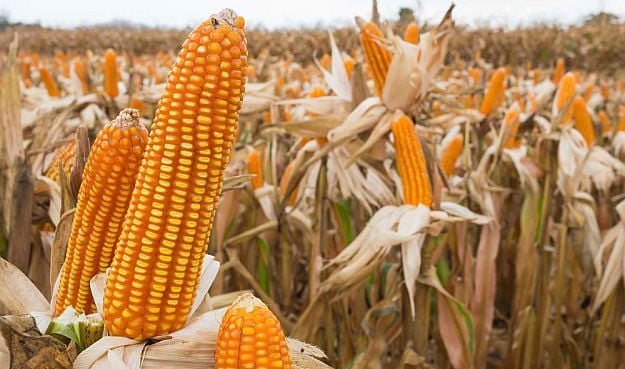Corn: The Nutrient-Packed Superfood for Your Health and Wellness
Corn is more than just a staple in many households—it’s a nutrient-rich superfood that offers a range of health benefits. From boosting heart health and digestion to supporting eye health and weight management, corn is packed with fiber, antioxidants, and essential vitamins. In this blog, we explore the amazing benefits of corn, how to incorporate it into your diet, and the various ways it can support your overall well-being. Learn why corn deserves a place in your healthy eating plan today!
Herbanics
4/7/20254 min read


The Amazing Health Benefits of Corn: A Versatile Superfood
Corn, also known as maize, is one of the most widely cultivated crops in the world. It’s a staple food in many countries and is used in a wide range of products, from cornmeal and popcorn to syrups and oils. While it’s often seen as a simple carbohydrate, corn is far more than just a source of energy—it’s also packed with essential nutrients that can support your health in many ways. Let’s dive into the nutritional profile and health benefits of this versatile superfood.
What is Corn?
Corn is a cereal grain that belongs to the grass family. It’s believed to have been domesticated by indigenous peoples of Mesoamerica around 9,000 years ago. Today, it is grown in many parts of the world and is consumed in various forms. There are several varieties of corn, including yellow, white, blue, and sweet corn. The most common form of corn in the United States and many other countries is yellow corn, which is often used for cornmeal, corn syrup, and animal feed.
Corn can be consumed in several ways, including as whole kernels, cornmeal, corn flour, or even corn syrup. It can be boiled, roasted, popped, or ground into flour for baking.
Nutritional Profile of Corn
Corn is rich in essential nutrients, making it a great addition to a balanced diet. Here’s the nutritional breakdown for 100 grams of whole corn:
Calories: 86 kcal
Carbohydrates: 19g
Protein: 3.2g
Fat: 1.35g
Fiber: 2.7g
Sugar: 6.3g
Vitamin C: 6.8mg (about 11% of the recommended daily value)
Potassium: 218mg
Magnesium: 37mg
Calcium: 2mg
Iron: 0.6mg
Folate: 42mcg (about 10% of the recommended daily value)
It also contains antioxidants like lutein and zeaxanthin, which are beneficial for eye health.
Top Health Benefits of Corn
1. Rich in Fiber for Digestive Health
Corn is an excellent source of fiber, particularly insoluble fiber, which plays a key role in promoting healthy digestion. Fiber helps to prevent constipation by adding bulk to the stool and facilitating regular bowel movements. A high-fiber diet is also linked to a reduced risk of colorectal cancer and diverticulitis.
2. Good Source of Antioxidants for Eye Health
Corn is a good source of lutein and zeaxanthin, antioxidants that are particularly beneficial for eye health. These antioxidants help filter harmful blue light, protect the retina, and reduce the risk of age-related macular degeneration (AMD), a leading cause of vision loss in older adults. Including corn in your diet can help maintain healthy eyes and vision as you age.
3. Supports Heart Health
The fiber in corn, combined with its content of magnesium and potassium, can contribute to improved heart health. Fiber helps to lower cholesterol levels, while magnesium and potassium help regulate blood pressure and prevent heart disease. The antioxidants in corn also play a role in reducing oxidative stress, which is a contributor to cardiovascular problems.
4. A Good Source of Energy
Corn is primarily composed of carbohydrates, making it a great energy source for the body. It provides a slow-releasing form of energy, helping to maintain steady blood sugar levels throughout the day. Corn also contains protein, which contributes to muscle repair and growth, making it a good addition to post-workout meals.
5. Supports Healthy Skin
Corn is rich in vitamin C, an essential nutrient for healthy skin. Vitamin C plays a vital role in collagen production, which helps maintain skin elasticity and reduce the appearance of fine lines and wrinkles. Additionally, the antioxidants in corn can help protect the skin from environmental damage caused by free radicals, such as pollution and UV rays.
6. Boosts Immunity
The vitamin C in corn supports a healthy immune system by enhancing the production of white blood cells that help fight off infections. It also acts as an antioxidant, neutralizing free radicals that could otherwise damage immune cells. Regular consumption of corn can help support your body's defense against illness.
7. Good for Bone Health
Corn contains magnesium, an essential mineral that plays a key role in bone health. Magnesium helps regulate calcium levels in the body and contributes to the formation and maintenance of strong bones. Pairing corn with other magnesium-rich foods like leafy greens and nuts can enhance bone density and reduce the risk of osteoporosis.
8. Weight Management
Corn is low in fat and provides fiber and protein, which contribute to feelings of fullness and satiety. It’s a great food to include in a balanced diet for weight management, as it can help control appetite and reduce the tendency to overeat.
How to Incorporate Corn Into Your Diet
Corn is a versatile food that can be easily incorporated into your daily meals. Here are some ways to enjoy it:
Corn on the cob: Boil, grill, or roast corn on the cob for a classic, healthy side dish.
Cornmeal: Use cornmeal to make cornbread, muffins, or as a base for polenta.
Popcorn: A healthy snack option when air-popped and lightly seasoned.
Corn tortillas: Use for tacos, burritos, or wraps.
Corn salad: Combine fresh corn with vegetables like tomatoes, onions, and bell peppers for a refreshing side dish.
Corn soup: Add corn to soups and stews for added texture and flavor.
Risks and Considerations
While corn is generally safe and healthy for most people, there are a few considerations:
High Glycemic Index: Corn has a relatively high glycemic index, which can cause a spike in blood sugar levels. People with diabetes should monitor their intake of corn and choose whole-grain options, such as corn on the cob or cornmeal, over processed forms like corn syrup or cornstarch.
Genetically Modified Organisms (GMOs): A significant portion of corn is genetically modified (GM). If you're concerned about GMOs, opt for organic corn or seek out non-GMO verified products.
Allergic Reactions: While rare, some people may have an allergy to corn or corn-based products. If you experience any unusual reactions after eating corn, consult a doctor.
Corn is not just a delicious and versatile food—it’s also a nutrient-dense superfood that offers a wide range of health benefits. From supporting heart health and digestion to providing energy and boosting immunity, corn is a great addition to any balanced diet. Whether you enjoy it as a side dish, in soups, or as a snack, corn can help fuel your body with essential nutrients and contribute to overall well-being. As with any food, it’s important to consume corn in moderation and be mindful of how it fits into your individual dietary needs.
